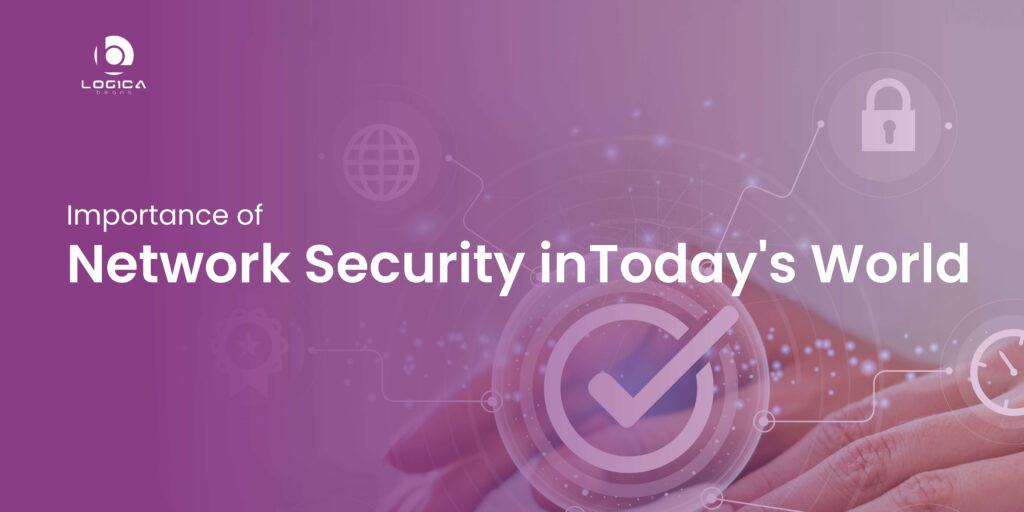The internet, which connects us to people and information from across the world, has become a crucial element of our everyday life in the modern world. Yet, the risk of cyberattacks and data breaches is rising along with this growing interconnectedness. There has never been a time when network security was more crucial. Hackers attack people and companies on a daily basis in an effort to take advantage of network weaknesses and steal valuable information or cause chaos with their systems.
It is impossible to overstate how crucial network security is for safeguarding both private and commercial information from these persistent attacks. Maintaining a secure network in the modern day is not just a good idea, but also essential.
With the increased reliance on technology, it is becoming increasingly important to safeguard all aspects of internet information and data. Data integrity has become one of the most critical issues for firms to address as the internet and computer networks increase in size. Let us examine why network security is so critical in today’s digital world.
What is Network Security?
The procedures and tools used to safeguard computer networks against unwanted access, assaults, and data breaches are referred to as network security. It includes putting in place a variety of security measures to guarantee the availability, confidentiality, and integrity of network resources. Firewalls, antivirus software, intrusion detection and prevention systems, encryption, and access control mechanisms are a few examples of security measures that can be used in networks. Network security is to keep network services available and reliable while preventing unwanted access, theft, or destruction of critical data.
Network security is one of the most important aspects to consider when working over the internet, LAN or other methods, no matter how small or big your business is. While there is no network that is immune to attacks, a stable and efficient network security system is essential to protecting client data. A good network security system helps businesses reduce the risk of falling victim to data theft and sabotage.
As the internet has become an integral part of our daily lives network security has become increasingly important. The possibility of security breaches and cyber assaults has substantially grown as more and more devices, such as smartphones, computers, tablets, and IoT (Internet of Things) devices, are being connected to the internet.
Protecting sensitive data, such as private and financial information, corporate data, and intellectual property, requires network security. It works to safeguard the availability, confidentiality, and integrity of data on a network and guards against unwanted access, data alteration, and data destruction.
Firewalls, intrusion detection and prevention systems, encryption, access restrictions, and security rules and procedures are just a few of the many layers of security that must be used to safeguard a network effectively. These security measures must be continually updated and maintained if they are to continue to be effective against the most recent attacks and weaknesses.
In general, network security is essential to modern life since it aids in defending people, companies, and organizations from the rising threat of cyberattacks and security breaches. To keep sensitive data safe and secure as technology develops further, it is crucial to maintain vigilance and be proactive in putting appropriate network security measures into place.
Impact of Network Security in Business
Being hacked on your network might put you out of business. Vandalism is possible. This usually entails inserting false information into the system. It is one of numerous methods employed by hackers. Your company’s integrity can be brought into question if incorrect information is planted, and customers can be deceived.
Network security safeguards your workstations from malicious software. It also maintains the security of shared data. By dividing down information into several components, encrypting these portions, and transferring them across distinct pathways, network security infrastructure provides various levels of protection to thwart MiM attacks.
When you connect to the internet, you can receive a lot of traffic. Massive traffic can disrupt system stability and expose system vulnerabilities. Network security improves network stability by eliminating lagging and downtimes by continuously monitoring any suspicious transaction that might undermine the system. If a hacker gets in and steals plans, ideas, or blueprints, the company will not be able to implement new designs and products. This might destroy the business or keep it stagnating.
Revenue loss is also inevitable for the firm. Most network assaults can cause a network to fail. Furthermore, the breach can cause downtime on your website’s front end and your entire network to crash, resulting in possible revenue loss and client churn. The longer it takes for the network to be restored, the more harm is done to your firm.
Importance of Network Security:
● It is an important part of cybersecurity:
Numerous technical phrases are used interchangeably, so you can hear individuals refer to cybersecurity as network security and vice versa. Cybersecurity is the overarching word. It entails safeguarding everything, including the network, as well as the devices and data. Network security is concerned with the network as a whole, which supports multiple systems and applications. While designing a cybersecurity plan, a security-minded firm (or individual) will not overlook network security.
● Network Security Protects Data:
Data is something that both organizations and individuals value and preserve. If you’re a business, your data might include marketing materials, financial information, and anything else that makes your company unique. Individuals have financial data and personal information that they do not want others to have access to. Network security guarantees that your data remains private.
● Improves Network Performance:
Effective network security not only keeps your network secure, but it also makes it function more efficiently. The important thing is to have a solid system that isn’t bogged down by unnecessary tools and programs. Search for systems that have been proved to function well. If you’re not sure what to look for, ask a service provider for their recommendations.
● Protection against ransomware:
Ransomware assaults are quite prevalent. For many, they are the most heinous type of attack. They are a sort of malware that threatens to release or prevent access to your data unless a ransom is paid. They might harm a single person or entire business.
● Cyberattacks are on the rise:
Attacks on critical infrastructure, such as the Colonial Pipeline, are becoming increasingly common. Companies, particularly large ones with money to pay ransoms, must invest in improved security today. There are several reasons why cyberattacks are on the rise. One example is the spread of the 5G network. As the network grows in size, so do its flaws. It is not enough to embrace something new and exciting like 5G; new security is also required. Developing technology, such as artificial intelligence and machine learning, is also beneficial to hackers. They no longer must hack systems manually; instead, they can put up systems that do it for them.
Threats to Network Security
Particularly with the growth of the Internet and linked devices, network security is a crucial component of modern computing. The hazards related to network security breaches have gotten worse as more businesses rely on digital communication and information exchange. It is crucial to comprehend these risks to properly defend against them since there are many of them and they are always changing.
Here are some of the most common threats to network security:
● Malware
Any malicious program intended to harm or interfere with computer systems or networks is referred to as malware. Malware includes things like Trojans, worms, viruses, and ransomware. Many methods, including email attachments, downloads from nefarious websites, and infected USB devices, can bring malware into a network.
● Phishing
Phishing is a social engineering assault that entails sending emails or messages that seem to be from a reputable source, such a bank or government agency, but are really intended to fool recipients into disclosing personal data, like login passwords or credit card details.
● Denial-of-service
Denial-of-service (DoS) attacks aim to render a network or website inaccessible to users by flooding it with traffic or employing other types of assault. This kind of assault, which may be conducted by an individual or a group, can seriously harm the network by making it inaccessible to authorized users.
● Man-in-the-middle-attacks
Man-in-the-middle (MitM) assaults occur when an attacker intervenes in a discussion between two parties in order to listen in or influence the dialogue. By intercepting connections between a user and a website, this kind of attack is frequently used to obtain personal data, such as passwords or credit card details.
● Insider threats
Insider threats are defined as deliberate or unintentional activities carried out by individuals who are a part of an organization, such as workers or contractors. These people have access to the network, and they can make use of their rights to steal, corrupt, or install malware.
● Unsecured endpoints
If endpoints, including PCs, servers, and mobile devices, are not adequately protected, they may be open to assaults. This may occur when software is out-of-date or if a device is stolen or misplaced.
● Password attacks
Password attacks include attempting to guess or break user passwords in order to gain unwanted access to a network. Attackers may utilize dictionary attacks, which use well-known terms or phrases to guess passwords, or brute-force techniques, which attempt every conceivable combination of letters, digits, and characters.
Components of Network Security
Network security is a multi-layered approach that uses various components to protect a network from cyber threats. Here are the five main components of network security in detail:
● Firewalls
Firewalls are security tools that keep an eye on and regulate incoming and outgoing network traffic in accordance with a set of established rules. They serve as a firewall between the network and the internet, limiting illegal access. Hardware, software, or a hybrid of the two can be used to build firewalls.
● Antivirus software
Software that detects, prevents, and removes malware from a network is known as antivirus software. It checks files and programs for known risks and can spot unusual activity that can point to a brand-new threat. Every device connected to the network normally has antivirus software installed, which is updated often to keep up with new threats.
● Intrusion detection and prevention systems
Systems for detecting and preventing network intrusions are known as intrusion detection and prevention systems (IDPS). They keep an eye on network traffic for odd behavior and can notify security managers of potential dangers. To stop an attack from spreading, IDPS may also automatically respond to threats by limiting traffic or cutting off connections.
● Encryption
Data is transformed into a code through the process of encryption to prevent unwanted access. Credit card details, passwords, and other sensitive data that is transferred over the network are protected using it. There are many levels at which encryption may be used, such as end-to-end, data-at-rest, and data-in-transit.
● Access control mechanism
Based on user identification and permissions, access control techniques are used to limit access to network resources. To guarantee that only authorized users may access network resources, this includes authentication and authorization protocols. There are several different levels at which access control measures can be used, including network devices, software, and data.
● Virtual private network
On the internet, VPNs are used to safely link branch offices or distant users to a network. To guarantee that data exchanged between the VPN client and the network is safe and confidential, they employ tunneling protocols and encryption. Site-to-site connection and remote access are two frequent uses for VPNs.
● Security information and event management
SIEM stands for Security Information and Event Management. SIEM systems gather and examine log data from various network devices in order to identify and react to security incidents. They can track user behavior, give visibility into network activities, and assist in identifying possible security breaches. SIEM systems are an important component of network security for enterprises with big, complicated networks.
Keeping Networks Running Safely
If you want to help safeguard networks from hackers and outthink those who consider undermining firms as a pastime, you’ll need the proper training. A well-rounded education in cyber and network security could expose you to many common methods hackers use to gain access to networks, provide you with the hands-on training you need to think beyond simple security methods, and keep even the most technically advanced, well-organized cybercriminal out. In any cyber security program, you should seek for the following abilities and training:
● Administer, troubleshoot, and manage hardware, software, or services in single-user, multi-user, or mixed-user settings.
● Analyze issues and monitor networks to ensure that they are accessible to users; discover consumer demands and utilize this knowledge to interpret, create, and assess network requirements.
● Plan, implement, and coordinate network security procedures, as well as install and monitor network security software.
● Learn how to utilize cyber security measures to control staff behavior and secure data in connection to information security.
● Learn how to do organizational vulnerability analysis and penetration testing. Additionally, you learn how to monitor and defend networks by developing fundamental security processes and policies.
Internet access, email, and the web, which are now essential for small businesses, pose several threats to computer systems and the protection of firm data. The bombardment of viruses, worms, and Trojan horses, exacerbated by the growing problem of spyware, adware, and blended threats, continues to target an organization’s network in a variety of ways.
A firm is continually at danger if it does not have adequate network protection and disaster recovery policies in place. So, to safeguard your personal information as well as your business assets, it’s crucial to maintain proper network security.
Conclusion
Network security is now essential for every firm that wants to safeguard its sensitive data, preserve consumer confidence, and avert costly data breaches because of the development of cyber threats and the growing reliance on technology. Never forget that maintaining network security is a continuous effort that calls for care and attention.
You can protect the integrity of your data and the safety of your network by putting the elements of network security into practice and keeping up with the most recent threats. Hence, take the essential actions to safeguard your network right away and be certain that you are doing all possible to defend your company against cyberattacks.










